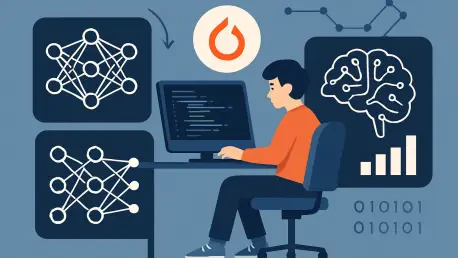Imagine a world where cutting-edge artificial intelligence tools, once reserved for elite tech giants, are now within reach of every aspiring developer, regardless of their resources or expertise. At the recent F8 Developer Conference, a pivotal announcement shifted the spotlight to AI’s transformative potential, promising to reshape how innovation unfolds across industries. This groundbreaking move centers on making sophisticated technology accessible to a wider audience, breaking down barriers that have long hindered smaller players from competing in the AI space. The focus of this initiative is a powerful deep learning framework designed to streamline development processes and accelerate the creation of intelligent applications. By prioritizing accessibility, the tech community stands on the brink of a new era where creativity and experimentation can flourish without the constraints of complex infrastructure or prohibitive costs. This bold step forward underscores a growing trend toward inclusivity in technology, setting a precedent for how advancements should be shared.
Advancing AI with PyTorch 1.0
The cornerstone of this initiative is PyTorch 1.0, a dynamic deep learning framework built on the open learning platform ONNX, developed through collaboration with industry leaders like Microsoft and Amazon. This framework aims to significantly reduce the time and effort required to train AI models, empowering developers to bring innovative solutions to life more efficiently. Set to roll out in beta form in the coming months, PyTorch 1.0 will offer an array of essential tools, libraries, and pre-trained models tailored to support core services. This strategic release is poised to lower entry barriers, enabling even those with limited technical backgrounds to harness the power of AI for diverse applications. Beyond mere functionality, the integration of Caffe2 into this framework enhances its versatility, ensuring seamless transitions from research to production environments. Such advancements reflect a broader mission to democratize access to cutting-edge resources, fostering an ecosystem where innovation thrives through shared knowledge and collaborative efforts.
Ethical AI and Practical Impacts
Reflecting on the broader implications, the integration of AI into everyday platforms reveals both its potential and its challenges, as demonstrated at the F8 conference. Within its ecosystem, AI already plays a crucial role in enhancing user experiences through personalized content, language translation, and social connectivity, while also tackling harmful content like misinformation and inappropriate material with an impressive object recognition accuracy of 85.4%. However, the reliance on vast datasets raises significant concerns about user privacy and the risk of misuse, prompting a strong commitment to ethical practices. Efforts to safeguard personal information and mitigate potential inequities were central to the discussions, highlighting a balanced approach to technological progress. Looking back, the focus on practical applications and ethical considerations showed a dedication to user trust, while the push for accessible tools like PyTorch 1.0 paved the way for future innovation. Moving forward, stakeholders must prioritize transparent policies and robust safeguards to ensure AI continues to benefit society responsibly.









